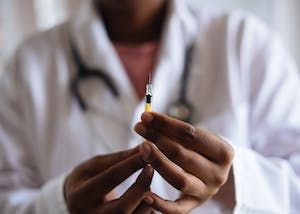COVID-19 Vaccination Provides Risk Reduction for Rheumatoid Arthritis Patients
The results show 88.1% of patients with rheumatoid arthritis in the study developed humoral immunogenicity.

COVID-19 vaccinations do yield humoral immunogenicity in patients with rheumatoid arthritis, according to new data presented during the 2022 American College of Rheumatology Convergence Meeting in Philadelphia.
A team, led by Esther Vicente-Rabaneda, Division of Rheumatology, Hospital Universitario de La Princesa, identified the efficacy and safety of the SARS-CoV-2 vaccine in a series of patients with rheumatoid arthritis.
Looking at the Data
In the retrospective, observational study, the investigators examined rheumatoid arthritis, fulfilling the ACR/EULAR 2010 classification criteria, vaccinated against the SARS-CoV-2 virus between December 2020 to October 2021.
Each participant had post-vaccination serology and subsequent follow-up for at least 6 months.
The team evaluated the efficacy and effectiveness of the vaccine using the serological response and the incidence of post-vaccination SARS-CoV-2 infection.
The investigators also looked at vaccine safety by recording adverse events and rheumatoid arthritis flares.
To identify factors associated with vaccine response, they performed logistic and linear multivariate regression analyzes adjusted for age, sex, and time elapsed from vaccination to serological determination.
Patient Demographics
Overall, the study included 118 patients with rheumatoid arthritis, with a mean age of 65.4±11.6 years and a mean evolution of 12.0±9.6 years. In addition, 87.2% of the patient population were women and 95.76% of the 118 patients completed the vaccination schedule.
The results show 88.1% of patients developed humoral immunogenicity.
The team also found that smoking (OR, 0.96; 95% CII, 0.94-0.99; P = 0.034) was the only variable significantly associated with a humoral response to the vaccine and the degree of serological response was significantly related to younger age (coefficient -16.11; 95% CI, -31.84 to -0.39; P = 0.045) and previous COVID-19 infection (coefficient 4.496; 95% CI, 3.604-5.388; P <0.001).
This had occurred in 17.8% of patients, 5% were severe. The infections were also associated with the male gender (P = 0.016). After vaccination, 18.6% of patients presented with SARS-CoV-2 infections, the majority of which were mild.
In the safety analysis, the investigators identified 19.5% of vaccine adverse events, the majority of which were mild and associated with age (OR, 0.95; 95% CI, 0.91-0.99; P = 0.042). Finally, rheumatoid arthritis flares were anecdotal and inversely related to age (OR, 0.95; 95% CI, 0.91-0.99; P = 0.042).
“Our results, with a limited sample, suggest that the SARS-CoV-2 vaccine induces adequate humoral immunogenicity, with an acceptable safety profile in RA patients, reducing the severity of SARS-CoV-2 infection,” the authors wrote.
The study, “Efficacy and Safety of the SARS-CoV-2 Vaccine in Patients with Rheumatoid Arthritis,” was published online by ACR.